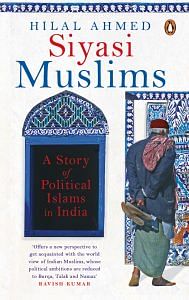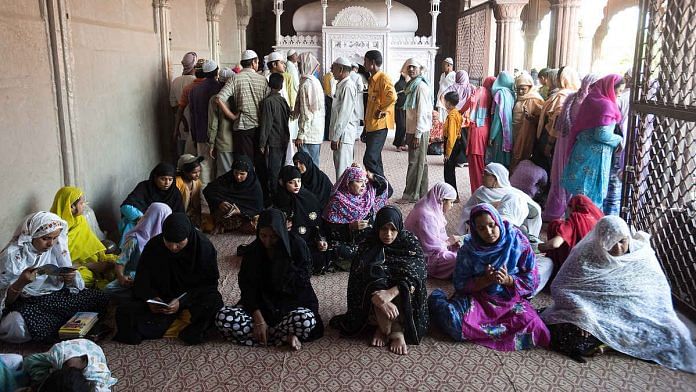- How do we make sense of the Muslims of India?
We are often told that they are highly diversified and plural, while at the same time they are treated as a homogeneous community, especially in political terms. Is this not self-contradictory? This is a legitimate question. And this book tries to offer a way out.
It addresses Muslims not as numbers but as a constitutional category, a religious minority and as a collectivity in two different senses. I see Muslims as a collectivity in a positive sense, when individuals with Muslim names and/or groups, who prefer to call themselves Islamic, are recognized as the beneficiary of constitutionally granted rights, such as the right to profess religion and the right to protect culture and heritage. However, I see Muslims as a collectivity in a negative sense, particularly when individuals with Muslim names and legally recognized minority institutions with Islamic contents are threatened and attacked, especially by Hindutva essentialists. In both cases, Muslimness is produced as an undifferentiated entity.
We are forced to imagine Muslims as one homogeneous community. This book is an attempt to demonstrate that Muslims are divided on caste, class and regional lines, which actually determine their politics.
- Is Muslim politics all about Muslim voting behaviour in elections?
No. Electoral politics is just one form of Muslim politics.
- Do Muslims always vote strategically?
Yes and no. Muslims, like other communities, vote as a group at the constituency level. But there is no evidence which suggests that there is a national Muslim vote bank.
- Why do Muslims not participate in secular political activities?
This is not correct. Actually, Muslims are always recognized only as Muslims. Their active participation in secular politics is ignored. It is very important to realize the fact that Muslims, like any other community in India, participate in all forms of politics without giving up their identities.
- What are ‘Muslim issues’?
There is this media-driven imagination of a package called Muslim issues. Debatable issues of Islamic identity are called Muslim issues. Hence, the Babri Masjid in Ayodhya, the protection of Muslim personal law, the protection of the minority status of Jamia Millia Islamia and Aligarh Muslim University, the protection of Urdu and, lately, the inclusion of Muslim Dalits in the Scheduled Caste (SC) list are treated as Muslim issues.
- Why are Muslims only concerned with their own interests?
This is not true. The Centre for the Study of Developing Societies (CSDS)-Lokniti surveys show that Muslim communities recognize unemployment, poverty and the lack of educational facilities as serious concerns of everyday life. Muslim assertions of this kind are never recorded and discussed in public discourse.
- Are they really nationalists?
This is an important question. But can we think of a yardstick to measure one’s nationalism? I have tried to engage with this question in the chapter on Hindutva and Muslims in the book.
- Do Indian Muslims admire ISIS or Al-Qaida–type political movements?
Indian Muslims comprise 18 crore people in this country. How could one make a claim on behalf of this huge and highly diversified population? That said, there is no evidence which suggests that the Muslims of India admire ISIS-type organizations. However, the symbolic presence of these global jihadi entities is always used to nurture anti-Muslim discourse in India.
- Why don’t they accept that Kashmir is an integral part of India?
The Kashmir dispute began as a regional movement in the 1980s. Gradually, it transformed into an Islamic issue. Direct support from Pakistan to militant organizations in the 1990s is responsible for this. Interestingly, however, postcolonial Muslim leadership did not recognize the Kashmir dispute as a Muslim issue. Actually, the Kashmir dispute goes against the norms of Muslim politics!
- Why do they want to follow sharia laws?
This is a media-driven question! CSDS-Lokniti surveys show that Muslims are not even aware of the idea of sharia itself. Muslim communities follow a highly localized set of norms and rules to manage their everyday lives, which are often described as ‘gair sharia’, or anti-sharia, by the ulema.
- What is the problem with the Ram temple in Ayodhya? Why don’t the Muslims give it to the Hindus?
The Ram Temple–Babri Masjid dispute is not a Hindu–Muslim issue. It is a dispute between three parties over a 2.77-acre land, which was acquired by the government in 1993. Since common Muslims and Hindus are not the stakeholders in this case, there is no point in debating this question.
- Why do Muslims oppose the BJP? What is their problem with Narendra Modi?
This is not true. On an average, 6–7 per cent of Muslims vote for the BJP at the national level. This went up to 9 per cent in 2014. This reflects the diversity of Muslim politics. In 2014, there was a tacit acceptance of Narendra Modi among Muslims. But he himself tried to cultivate the perception that Muslims hate him and do not vote in his name! It has helped him in consolidating the BJP’s pro-Hindutva constituency in the post-2014 scenario.
 This excerpt from Siyasi Muslims by Hilal Ahmed has been published with permission from Penguin Random House India.
This excerpt from Siyasi Muslims by Hilal Ahmed has been published with permission from Penguin Random House India.




If this has happened then culprits being of any religion cast or creed should be punished severly.Let the mankind be survived solely.This earth is full of shit results from Men and his anger. Enough is enough not a single woman or child deserves this.Be any party or country, if they cannot protect Women and children than that is the worst party and country.
Well, i don’t think that Shia Muslims do not vote for the BJP and it is disingenuous for you to collectivize the community even as you rant against Muslims being treated as a monolithic block. Second, as for Muslim support for Kashmiri insurgents and Pakistan in general, again i don’t think that the hardliners, in particular the Sunni Deobandis can be accused of that. They refused to support partition which the Sufistic moderates supported and Pakistanis, by and far, are not followers of the Deoband.
Shame
U seem to be spreding hatred by ur artcles where non exsists .pl dont creat hatred.
Interesting article.
If you could please share the source for the percentage of Muslim vote towards bjp.